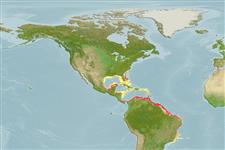Teleostei (teleosts) >
Perciformes/Scorpaenoidei (Scorpionfishes) >
Triglidae (Searobins) > Prionotinae
Etymology: Prionotus: Greek, prion, -onos = saw + Greek, noton = back (Ref. 45335).
Eponymy: Tarleton Hoffman Bean (1846–1916) was an American ichthyologist and elder brother of B A Bean who was also an ichthyologist. [...] (Ref. 128868), visit book page.
More on author: Goode.
Environment: milieu / climate zone / depth range / distribution range
Ecology
Marine; demersal; depth range 35 - 200 m (Ref. 5217). Tropical
Western Atlantic: Panama to Brazil.
Size / Weight / Age
Maturity: Lm ? range ? - ? cm
Max length : 15.0 cm TL male/unsexed; (Ref. 5217); common length : 12.0 cm TL male/unsexed; (Ref. 5217)
Found on sand or rubble bottoms.
Life cycle and mating behavior
Maturity | Reproduction | Spawning | Eggs | Fecundity | Larvae
Cervigón, F., R. Cipriani, W. Fischer, L. Garibaldi, M. Hendrickx, A.J. Lemus, R. Márquez, J.M. Poutiers, G. Robaina and B. Rodriguez, 1992. Fichas FAO de identificación de especies para los fines de la pesca. Guía de campo de las especies comerciales marinas y de aquas salobres de la costa septentrional de Sur América. FAO, Rome. 513 p. Preparado con el financiamento de la Comisión de Comunidades Europeas y de NORAD. (Ref. 5217)
IUCN Red List Status (Ref. 130435: Version 2024-2)
Threat to humans
Harmless
Human uses
Fisheries: bycatch
Tools
Special reports
Download XML
Internet sources
Estimates based on models
Preferred temperature (Ref.
123201): 21.5 - 27.3, mean 25.2 °C (based on 76 cells).
Phylogenetic diversity index (Ref.
82804): PD
50 = 0.5000 [Uniqueness, from 0.5 = low to 2.0 = high].
Bayesian length-weight: a=0.00525 (0.00223 - 0.01237), b=3.13 (2.92 - 3.34), in cm total length, based on LWR estimates for this (Sub)family-body shape (Ref.
93245).
Trophic level (Ref.
69278): 3.5 ±0.5 se; based on size and trophs of closest relatives
Resilience (Ref.
120179): High, minimum population doubling time less than 15 months (Preliminary K or Fecundity.).
Fishing Vulnerability (Ref.
59153): Low vulnerability (10 of 100).
